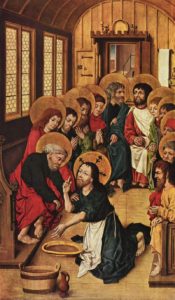 In his three years of public ministry, Jesus drew great crowds to hear his teaching. Of those who heard him, a smaller number chose to make a commitment to him. These were his disciples. They took up his discipline, his way of life, and lived by his doctrine. From those many disciples he chose twelve, who would be leaders. In the Gospels they are called Apostles, or sometimes simply “the Twelve.”
In his three years of public ministry, Jesus drew great crowds to hear his teaching. Of those who heard him, a smaller number chose to make a commitment to him. These were his disciples. They took up his discipline, his way of life, and lived by his doctrine. From those many disciples he chose twelve, who would be leaders. In the Gospels they are called Apostles, or sometimes simply “the Twelve.”
Jesus closely identified himself with these men. He said to them: “He who hears you hears me, and he who rejects you rejects me, and he who rejects me rejects him who sent me” (Luke 10:16). By the power of the Holy Spirit, they were to be Jesus’ “witnesses … to the end of the earth” (Acts 1:8).
He gave the Apostles extraordinary authority, and it extended beyond earth and even to heaven. He said: “whatever you bind on earth shall be bound in heaven, and whatever you loose on earth shall be loosed in heaven” (Matthew 18:18). He also told them: “If you forgive the sins of any, they are forgiven; if you retain the sins of any, they are retained” (John 20:23). Forgiveness of sins was a power that belonged to God alone (see Mark 2:7,10), but now it was given to a dozen men.
Nor was it to cease when they died. The New Testament’s history of the Church, the Acts of the Apostles, begins with the filling of the vacancy left at the death of Judas. “His office let another take” (Acts 1:20).
So we see that the office of bishop was necessary in the Church established by Jesus, and that bishops spoke with the authority of Jesus himself.
This does not mean that bishops are flawless. The Church holds all its treasures in earthen vessels (2 Corinthians 4:7), and the defects of the Apostles are placed on display in the writings of the Apostles. Peter was, by turns, cowardly and full of bluster. Judas was a thief, a liar, a cheat, and a traitor. All of the Twelve except John fled on Good Friday and left Jesus defenseless and alone.
But the Risen Lord did not cut them off or seek better candidates. He forgave them and sent them out as his face and voice — his very person — to reach the world.
The bishops who hold office today are successors of the Apostles. We know the doctrine of Apostolic Succession not only because we see it in the New Testament, but also because it was taught by one of the men established in office by the Apostles themselves. St. Clement was ordained by Peter and Paul to serve as bishop of Rome. Writing in the first century, he said: “Our Apostles knew through our Lord Jesus Christ that there would be strife over the office of bishop. For this reason, having received complete foreknowledge, they appointed men, and afterwards they provided a continuance, that if these should fall asleep, other approved men should succeed them in ministry.”
From then till now, the chain of succession has never been broken. No bishop is perfect. Every bishop has flaws, as the Apostles did. But every bishop acts in the person of Christ. Every bishop is called to be a point of unity in the local Church entrusted to him. Every bishop is a teacher, and a stay against confusion.

